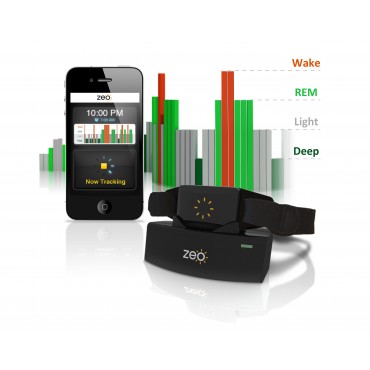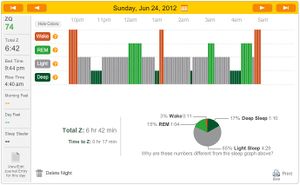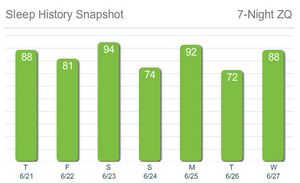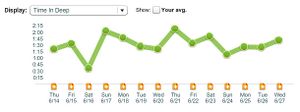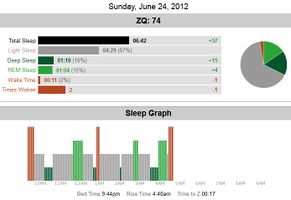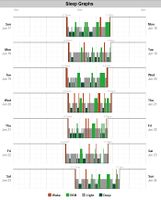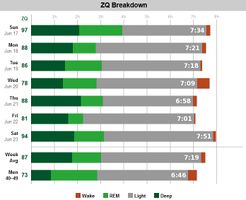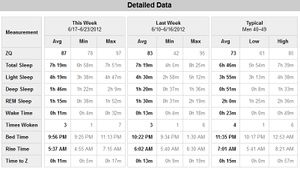Difference between revisions of "Zeo Sleep Monitor"
User:Fellrnr (User talk:Fellrnr | contribs) m |
User:Fellrnr (User talk:Fellrnr | contribs) |
||
| (6 intermediate revisions by the same user not shown) | |||
| Line 1: | Line 1: | ||
[[File:Zeo mobile box image.jpg|right|thumb|500px|The Zeo sleep monitor.]] | [[File:Zeo mobile box image.jpg|right|thumb|500px|The Zeo sleep monitor.]] | ||
| − | The Zeo Sleep Monitor can measure your sleep patterns and enable you to improve your sleep quality. Sleep is a critical part of life, especially for an athlete and many of us do not get enough<ref name="SleepCDC"/>. I've found the Zeo to be an effective tool for improving my sleep, and | + | The Zeo Sleep Monitor can measure your sleep patterns and enable you to improve your sleep quality. Sleep is a critical part of life, especially for an athlete and many of us do not get enough<ref name="SleepCDC"/>. I've found the Zeo to be an effective tool for improving my sleep, and the best of the sleep monitors, but sadly [http://www.wired.com/business/2013/03/lights-out-for-zeo/ Zeo is out of business]. However, you can still [http://www.amazon.com/Zeo-ZEO301-Sleep-Manager-Pro/dp/B008I20LJ2 buy the Zeo], though it's not clear for how long. The best alternative to the Zeo at the moment is the [[Basis Activity Tracker]]. |
=The importance of sleep= | =The importance of sleep= | ||
| Line 10: | Line 10: | ||
* Recovery immediately following exercise is impaired by poor sleep<ref name="SleepDepRecovery"/>. | * Recovery immediately following exercise is impaired by poor sleep<ref name="SleepDepRecovery"/>. | ||
* A lack of sleep is linked to [[Sleep and Obesity|Obesity]]. | * A lack of sleep is linked to [[Sleep and Obesity|Obesity]]. | ||
| − | + | * Even mild sleep deprivation produces similar impairment to alcohol. After 17–19 hours without sleep, which is being awake from 0800 to 2230 and 0100, a study showed test performance was similar or worse than that at a blood alcohol level of 0.05%, and response speeds were up to 50% slower for some tests<ref name="Williamson2000"/>. | |
=How the Zeo Works= | =How the Zeo Works= | ||
The Zeo uses a headband to monitor brain waves and transmits to the information to a base station, or to supported phones or tablets. The Zeo determines what sleep stage you are in with reasonable accuracy. From this, the Zeo gives an overall score to your sleep (ZQ), as well as recording how long you sleep in each sleep stage. The app provides reports on your sleep history and can automatically upload the results to the web for more detailed analysis. | The Zeo uses a headband to monitor brain waves and transmits to the information to a base station, or to supported phones or tablets. The Zeo determines what sleep stage you are in with reasonable accuracy. From this, the Zeo gives an overall score to your sleep (ZQ), as well as recording how long you sleep in each sleep stage. The app provides reports on your sleep history and can automatically upload the results to the web for more detailed analysis. | ||
| Line 25: | Line 25: | ||
=Accuracy= | =Accuracy= | ||
| − | Zeo has been compared with polysomnography (PSG) to verify its accuracy. (PSG monitors brain activity (EEG), eye movement, muscle activity and heart rhythm, and is the gold standard of sleep analysis.) The study stated that "Our results demonstrate that the [Zeo] accuracy is similar to but not quite as good as the two human scorers from different sleep centers compared to each other"<ref name="SleepZeoPSG"/>. | + | Zeo has been compared with polysomnography (PSG) to verify its accuracy. (PSG monitors brain activity (EEG), eye movement, [[Muscle|muscle]] activity and heart rhythm, and is the gold standard of sleep analysis.) The study stated that "Our results demonstrate that the [Zeo] accuracy is similar to but not quite as good as the two human scorers from different sleep centers compared to each other"<ref name="SleepZeoPSG"/>. |
=Zeo Caveats= | =Zeo Caveats= | ||
| Line 41: | Line 41: | ||
* Getting slightly chilly before bed helps me fall asleep faster and the room temperature is critical for quality sleep. | * Getting slightly chilly before bed helps me fall asleep faster and the room temperature is critical for quality sleep. | ||
* A brief nap does not impact my night's sleep, but a longer nap can be remarkably disruptive. | * A brief nap does not impact my night's sleep, but a longer nap can be remarkably disruptive. | ||
| − | * I wake up briefly virtually every night at about 1am, so I now make a protein drink to take at that time. This protein drink helps me sleep deeper in the second half of the night. | + | * I wake up briefly virtually every night at about 1am, so I now make a [[Protein|protein]] drink to take at that time. This protein drink helps me sleep deeper in the second half of the night. |
* Having a protein shake before bed may help increase the amount of time I'm deeply asleep. | * Having a protein shake before bed may help increase the amount of time I'm deeply asleep. | ||
* The amount of deep sleep seems to be critical for how I feel and how well I run, but other sleep stages are not so important. | * The amount of deep sleep seems to be critical for how I feel and how well I run, but other sleep stages are not so important. | ||
* Waking up in the night does not affect my sleep quality as much as I'd expect, and I wake up far more often than I realized. | * Waking up in the night does not affect my sleep quality as much as I'd expect, and I wake up far more often than I realized. | ||
* Even slight levels of pain degrade my sleep quality dramatically. That shouldn't be a surprise, but I thought that once I'd gone to sleep, the pain wouldn't be a problem. | * Even slight levels of pain degrade my sleep quality dramatically. That shouldn't be a surprise, but I thought that once I'd gone to sleep, the pain wouldn't be a problem. | ||
| − | * I fall asleep quite quickly, and I can use a [[Pulse Oximeter]] as part of my relaxation routine. The [[Pulse Oximeter]] shows my heart rate, which gives me an idea of my stress levels, and acts as a biofeedback mechanism to show how well I'm relaxing. The CMS-50E has a graph of the heart rate, and I find this almost hypnotic. | + | * I fall asleep quite quickly, and I can use a [[Pulse Oximeter]] as part of my relaxation routine. The [[Pulse Oximeter]] shows my [[Heart Rate|heart rate]], which gives me an idea of my stress levels, and acts as a biofeedback mechanism to show how well I'm relaxing. The CMS-50E has a graph of the heart rate, and I find this almost hypnotic. |
=Other Tips for Improving Sleep = | =Other Tips for Improving Sleep = | ||
| Line 57: | Line 57: | ||
=Alternatives to Zeo= | =Alternatives to Zeo= | ||
There are a number of alternatives to the Zeo, but none of them have been evaluated against the gold standard of sleep studies, polysomnography (PSG) and none of them look at brain activity directly in the way the Zeo does. Most of the alternatives use movement to detect if you're awake or asleep. This approach, called Actigraphy, can be good at detecting if you're asleep or not<ref name="SleepActigraphy"/>, but it lacks accuracy with disrupted sleep<ref name="SleepAcit2006"/><ref name="SleepAcit2007"/>. A comparison between Zeo, PSG and Actigraphy showed that Zeo was better at differentiating sleep from wakefulness than Actigraphy. In addition, Actigraphy does not tell you if you're in light sleep, deeply asleep, in REM sleep. | There are a number of alternatives to the Zeo, but none of them have been evaluated against the gold standard of sleep studies, polysomnography (PSG) and none of them look at brain activity directly in the way the Zeo does. Most of the alternatives use movement to detect if you're awake or asleep. This approach, called Actigraphy, can be good at detecting if you're asleep or not<ref name="SleepActigraphy"/>, but it lacks accuracy with disrupted sleep<ref name="SleepAcit2006"/><ref name="SleepAcit2007"/>. A comparison between Zeo, PSG and Actigraphy showed that Zeo was better at differentiating sleep from wakefulness than Actigraphy. In addition, Actigraphy does not tell you if you're in light sleep, deeply asleep, in REM sleep. | ||
| + | * The best alternative to the Zeo at the moment is the [[Basis Activity Tracker]], which combines movement detection, heart rate, skin temperature and perspiration rate to detect sleep state. | ||
* The cheapest are the simple apps that use a smartphone's accelerometer to measure movement and thus evaluate your sleep. It's not clear how well these apps work, and are likely to be dependent on the type of mattress you have, if you sleep alone or not, and the placement of the phone. On the other hand, they are remarkably cheap. | * The cheapest are the simple apps that use a smartphone's accelerometer to measure movement and thus evaluate your sleep. It's not clear how well these apps work, and are likely to be dependent on the type of mattress you have, if you sleep alone or not, and the placement of the phone. On the other hand, they are remarkably cheap. | ||
* The LARK uses a movement sensor that straps to your wrist and connects to a smart phone. This gives far more accuracy than simply relying on a smartphone on your mattress. The price is more expensive than the Zeo, with the LARK Pro costing $159. There is a cheaper version at $99 that does not include the ability to track sleep. More at [http://www.lark.com/]. | * The LARK uses a movement sensor that straps to your wrist and connects to a smart phone. This gives far more accuracy than simply relying on a smartphone on your mattress. The price is more expensive than the Zeo, with the LARK Pro costing $159. There is a cheaper version at $99 that does not include the ability to track sleep. More at [http://www.lark.com/]. | ||
| − | * Gear4 Renew SleepClock has a different approach, using radio waves to detect movement and breathing. It's more expensive than the Zeo at $199 and there is no supporting research about its accuracy. More at [http:// | + | * Gear4 Renew SleepClock has a different approach, using radio waves to detect movement and [[Breathing|breathing]]. It's more expensive than the Zeo at $199 and there is no supporting research about its accuracy. More at [http://www.gear4.com/product/_/426/renew-sleepclock/ gear4.com] |
=References= | =References= | ||
| Line 77: | Line 78: | ||
<ref name="SleepCDC">CDC - Sleep Home Page - Sleep and Sleep Disorders http://www.cdc.gov/sleep/ </ref> | <ref name="SleepCDC">CDC - Sleep Home Page - Sleep and Sleep Disorders http://www.cdc.gov/sleep/ </ref> | ||
<ref name="OTEcssPos">Prevention, diagnosis and treatment of the Overtraining Syndrome http://www.ingentaconnect.com/content/tandf/tejs/2006/00000006/00000001/art00001 </ref> | <ref name="OTEcssPos">Prevention, diagnosis and treatment of the Overtraining Syndrome http://www.ingentaconnect.com/content/tandf/tejs/2006/00000006/00000001/art00001 </ref> | ||
| + | <ref name="Williamson2000">A M Williamson, Moderate sleep deprivation produces impairments in cognitive and motor performance equivalent to legally prescribed levels of alcohol intoxication, Occupational and Environmental Medicine, volume 57, issue 10, 2000, pages 649–655, ISSN [http://www.worldcat.org/issn/13510711 13510711], doi [http://dx.doi.org/10.1136/oem.57.10.649 10.1136/oem.57.10.649]</ref> | ||
</references> | </references> | ||
Latest revision as of 15:48, 27 July 2014
The Zeo Sleep Monitor can measure your sleep patterns and enable you to improve your sleep quality. Sleep is a critical part of life, especially for an athlete and many of us do not get enough[1]. I've found the Zeo to be an effective tool for improving my sleep, and the best of the sleep monitors, but sadly Zeo is out of business. However, you can still buy the Zeo, though it's not clear for how long. The best alternative to the Zeo at the moment is the Basis Activity Tracker.
Contents
1 The importance of sleep
Sleep is of particular importance for the athlete:
- More than 95% of the daily production of growth hormones occurs during Non REM sleep[2].
- The old saying "practice makes perfect" has been rephrased as "practice, with sleep, makes perfect". This reflects the way that we continue to improve a motor skill even after we stop practicing, and this continued improvement occurs during sleep[2].
- Continued poor quality sleep, or successive nights of disrupted or shortened sleep increases vulnerability to infections[2].
- Lack of sleep is linked to Overtraining Syndrome[3].
- Recovery immediately following exercise is impaired by poor sleep[4].
- A lack of sleep is linked to Obesity.
- Even mild sleep deprivation produces similar impairment to alcohol. After 17–19 hours without sleep, which is being awake from 0800 to 2230 and 0100, a study showed test performance was similar or worse than that at a blood alcohol level of 0.05%, and response speeds were up to 50% slower for some tests[5].
2 How the Zeo Works
The Zeo uses a headband to monitor brain waves and transmits to the information to a base station, or to supported phones or tablets. The Zeo determines what sleep stage you are in with reasonable accuracy. From this, the Zeo gives an overall score to your sleep (ZQ), as well as recording how long you sleep in each sleep stage. The app provides reports on your sleep history and can automatically upload the results to the web for more detailed analysis.
- Zeo Sleep Analysis
3 Accuracy
Zeo has been compared with polysomnography (PSG) to verify its accuracy. (PSG monitors brain activity (EEG), eye movement, muscle activity and heart rhythm, and is the gold standard of sleep analysis.) The study stated that "Our results demonstrate that the [Zeo] accuracy is similar to but not quite as good as the two human scorers from different sleep centers compared to each other"[6].
4 Zeo Caveats
I highly recommend the Zeo to you as long as you understand its caveats.
- The Zeo will not directly improve your sleep, but by providing quality data it will allow you to make changes and know how effective the changes are. A 6 week study showed that in practice the average sleep quality improved with Zeo usage[7]. This suggests that in practice, people are able to effectively use the data.
- Fitting the headband is critical as poor contact will result in poor data. The headband needs to sit low on the back of your head, going over your ears so that it has a stable fit. The headband needs to be tight enough that it does not come off as you move in your sleep. I found the headband stretched over time, so you have to check the fit regularly.
- I tried the Zeo app on my iPad, iTouch and Android tablet and I've only had one bug (on the iPad). I now routinely close all other apps before using Zeo and I've not had another issue. (I have not tried the Zeo that has a bedside unit.)
- The iPad 3 charges very slowly while Zeo is running and I found the iPad Zeo app the most useful, but the least intuitive as you have to rotate the display to get different information shown.
5 Things I learned with Zeo
There are a number of things I've learned or had confirmed with Zeo:
- The first thing I learned from Zeo is that I was not getting as much sleep as I thought I was.
- Light levels before bedtime are critical as exposure to light inhibits the release of melatonin. I now keep the lights low near bedtime, as well as reducing my monitor brightness and color temperature.
- Getting slightly chilly before bed helps me fall asleep faster and the room temperature is critical for quality sleep.
- A brief nap does not impact my night's sleep, but a longer nap can be remarkably disruptive.
- I wake up briefly virtually every night at about 1am, so I now make a protein drink to take at that time. This protein drink helps me sleep deeper in the second half of the night.
- Having a protein shake before bed may help increase the amount of time I'm deeply asleep.
- The amount of deep sleep seems to be critical for how I feel and how well I run, but other sleep stages are not so important.
- Waking up in the night does not affect my sleep quality as much as I'd expect, and I wake up far more often than I realized.
- Even slight levels of pain degrade my sleep quality dramatically. That shouldn't be a surprise, but I thought that once I'd gone to sleep, the pain wouldn't be a problem.
- I fall asleep quite quickly, and I can use a Pulse Oximeter as part of my relaxation routine. The Pulse Oximeter shows my heart rate, which gives me an idea of my stress levels, and acts as a biofeedback mechanism to show how well I'm relaxing. The CMS-50E has a graph of the heart rate, and I find this almost hypnotic.
6 Other Tips for Improving Sleep
Here are some other tips for improving your sleep quality.
- High intensity exercise late in the evening may impair sleep quality[8], whereas exercise in the morning can improve sleep quality[9].
- While Alcohol can help you fall asleep, it reduces the overall quality of sleep, especially later in the night[10].
- Avoid Caffeine later in the day[11].
- Many people find that random noise, such as rain or ocean waves, helps them sleep. I have found the app Sleep! to be quite effective.
7 Alternatives to Zeo
There are a number of alternatives to the Zeo, but none of them have been evaluated against the gold standard of sleep studies, polysomnography (PSG) and none of them look at brain activity directly in the way the Zeo does. Most of the alternatives use movement to detect if you're awake or asleep. This approach, called Actigraphy, can be good at detecting if you're asleep or not[12], but it lacks accuracy with disrupted sleep[13][14]. A comparison between Zeo, PSG and Actigraphy showed that Zeo was better at differentiating sleep from wakefulness than Actigraphy. In addition, Actigraphy does not tell you if you're in light sleep, deeply asleep, in REM sleep.
- The best alternative to the Zeo at the moment is the Basis Activity Tracker, which combines movement detection, heart rate, skin temperature and perspiration rate to detect sleep state.
- The cheapest are the simple apps that use a smartphone's accelerometer to measure movement and thus evaluate your sleep. It's not clear how well these apps work, and are likely to be dependent on the type of mattress you have, if you sleep alone or not, and the placement of the phone. On the other hand, they are remarkably cheap.
- The LARK uses a movement sensor that straps to your wrist and connects to a smart phone. This gives far more accuracy than simply relying on a smartphone on your mattress. The price is more expensive than the Zeo, with the LARK Pro costing $159. There is a cheaper version at $99 that does not include the ability to track sleep. More at [1].
- Gear4 Renew SleepClock has a different approach, using radio waves to detect movement and breathing. It's more expensive than the Zeo at $199 and there is no supporting research about its accuracy. More at gear4.com
8 References
- ↑ CDC - Sleep Home Page - Sleep and Sleep Disorders http://www.cdc.gov/sleep/
- ↑ 2.0 2.1 2.2 http://www.ajol.info/index.php/sajrs/article/view/76882
- ↑ Prevention, diagnosis and treatment of the Overtraining Syndrome http://www.ingentaconnect.com/content/tandf/tejs/2006/00000006/00000001/art00001
- ↑ The effect of sleep loss on high int... [Aviat Space Environ Med. 1984] - PubMed - NCBI http://www.ncbi.nlm.nih.gov/pubmed/6508684
- ↑ A M Williamson, Moderate sleep deprivation produces impairments in cognitive and motor performance equivalent to legally prescribed levels of alcohol intoxication, Occupational and Environmental Medicine, volume 57, issue 10, 2000, pages 649–655, ISSN 13510711, doi 10.1136/oem.57.10.649
- ↑ Validation of an automated wireless system to monitor sleep in healthy adults - SHAMBROOM - 2011 - Journal of Sleep Research - Wiley Online Library http://onlinelibrary.wiley.com/doi/10.1111/j.1365-2869.2011.00944.x/abstract
- ↑ Zeo Home Use Test Mid-Term Response http://www.myzeo.com/sleep/sites/default/files/Zeo%20HUT%20White%20Paper_2009.pdf
- ↑ Taylor & Francis Online http://www.tandfonline.com/doi/pdf/10.1080/09291016.2011.589159
- ↑ Effects of endurance and strength acute exercise on night sleep quality http://www.ismj.com/pages/311417173/ISMJ/journals/articles/Vol-12-No3-2011/Effects-of-endurance-and-strength-acute-exercise-on-night-sleep-quality.asp
- ↑ Sleep, Sleepiness, and Alcohol Use http://pubs.niaaa.nih.gov/publications/arh25-2/101-109.htm
- ↑ Sleep tips: 7 steps to better sleep - MayoClinic.com http://www.mayoclinic.com/health/sleep/HQ01387/
- ↑ The role and validity of actigraphy in sleep m... [Sleep Med Rev. 2011] - PubMed - NCBI http://www.ncbi.nlm.nih.gov/pubmed/21237680
- ↑ Actigraphy. [Respir Care Clin N Am. 2006] - PubMed - NCBI http://www.ncbi.nlm.nih.gov/pubmed/16530645
- ↑ Wake Detection Capacity of Actigraphy During Sleep http://www.ncbi.nlm.nih.gov/pmc/articles/PMC2266273/
